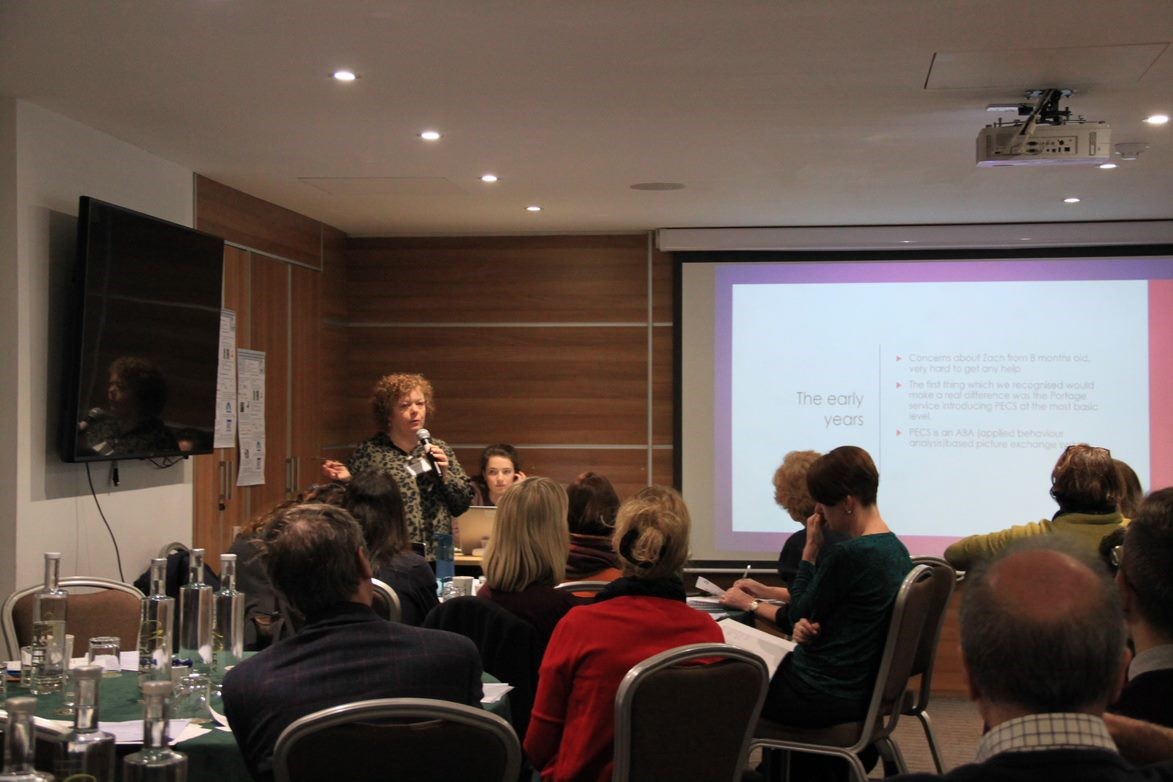CB-NSG March 2020: Good Outcome-Good Life
The Challenging Behaviour National Strategy Group meeting titled ‘Good Outcome- Good Life’ was held on the 6th March at The Wesley Euston Hotel. The meeting focussed on the delivery of outcomes, and how outcomes can be used to ensure children, young people and adults with learning disabilities and/or autism have good lives. This included considering how to be outcome focussed, the challenges, how these can be overcome, what is needed and identifying and agreeing actions to take the work forward.
Discussions and identification of actions focused around the Challenging Behaviour Charter point one:
People will be supported to exercise their human rights (which are the same as everyone else’s) to be healthy, full and valued members of their community with respect for their culture, ethnic origin, religion, age, gender, sexuality and disability.
The planned outcomes for the meeting were as follows:
- To understand what good outcomes are for children, young people and adults with learning disabilities and/or autism and the need to focus on these
- To consider how to deliver good outcomes for children, young people and adults with learning disabilities and/or autism and their families
- To consider ways of measuring outcomes and how the education, health and care systems can promote this approach
- To consider the impact of outcomes for children, young people and adults with learning disabilities and how this can be used to maintain and develop good support
- To share best practice around achieving good outcomes and develop ways to replicate it
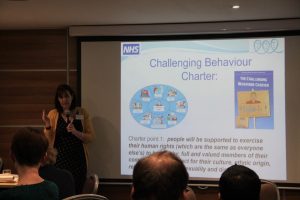
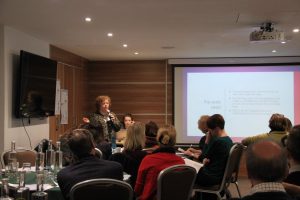
The day opened with presentations including from family carer, Emma Saysell, on the support package she has developed for her son; David Nuttall from the Department of Health and Social Care on Transforming Care figures; and Ray James from NHS England who updated on progress towards development of regional expertise since the last meeting. Afternoon presentations included from Alison Carter who provided an update about the CQC’s Thematic Review into long-term restraint and seclusion; the Tizard / CBF Family Carer Research Alliance was then introduced by Nick Gore (the Tizard Centre) and Jo Griffin (family carer) and the group’s promotional film was shown. To find out more about the Tizard / CBF Family carer Research Alliance you can watch a short film here.
Attendees had the opportunity to choose two of 7 workshops to attend which were focussed around the theme of outcomes.
Workshops
Hearing the Voice of children, young people and families in order to achieve good outcomes

Jacqui Shurlock from the CBF and Rowena Rossiter from the University of Kent facilitated a workshop to discuss how we can better listen to children and their families to facilitate the identification and achievement of better outcomes. They updated the group on recent work in the area and facilitated discussions on identifying how we might start to translate some of the best practice into everyday experiences for children and families.
The actions from the workshop are available here
Delivering Outcomes from a Support Worker Perspective
Jackie and Ceri Edwards facilitated a workshop explaining the support system they had set up for their son and brother, Rhys. Their enterprise is funded by the Local Authority through a provider, however, the family is heavily involved in the management of the team which includes Rhys’ brother, Ceri. The group discussed ways in which support workers and teams can be developed sustainably and in collaboration with families, and how good outcomes can be achieved for other families who may not be able to replicate the Edwards’ approach.
The actions from the workshop are available here
Can the Mental Health Act Deliver Good Outcomes for People with Learning Disabilities and/or Autism?
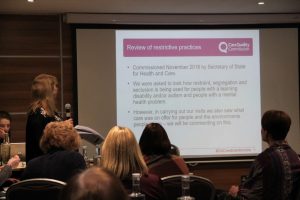 This workshop discussed how to improve outcomes through a better understanding of the purpose of the Mental Health Act, how it might be used to protect against arbitrary and inappropriate detention, and also how it provides a means of appeal where detention in hospital is either not appropriate or no longer appropriate. The group discussed how the MHA might be used to ensure that only those people who genuinely require treatment for a mental disorder in hospital have their rights to appropriate treatment met but that those not requiring treatment in hospital are not detained against their will. The group discussed how the MHA should be a protector of human rights but so often for people with learning disabilities and/ autism it is not and whether outcomes prior or after detention can be improved.
This workshop discussed how to improve outcomes through a better understanding of the purpose of the Mental Health Act, how it might be used to protect against arbitrary and inappropriate detention, and also how it provides a means of appeal where detention in hospital is either not appropriate or no longer appropriate. The group discussed how the MHA might be used to ensure that only those people who genuinely require treatment for a mental disorder in hospital have their rights to appropriate treatment met but that those not requiring treatment in hospital are not detained against their will. The group discussed how the MHA should be a protector of human rights but so often for people with learning disabilities and/ autism it is not and whether outcomes prior or after detention can be improved.
The actions from the workshop are available here
Regional Outcomes
In this workshop attendees recognised the need to better capture information about whether people’s outcomes are being met through the Transforming Care Programme. Although lots of data is collected, very little information is consistently captured about people’s experiences and outcomes in a way that enables us to shape our support differently, and in response to what matters most to people. The group considered how best to develop a standardised set of outcome measures.
You can view actions from this workshop here
Support Worker Movement
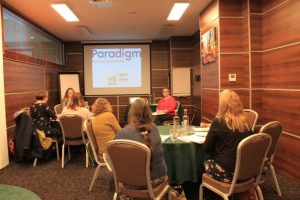 Sally Warren from Paradigm introduced the Gr8 Support Movement whereby support workers connect electronically to share their experiences and show appreciation for one another. The movement also encourages support worker employers to look for different attributes which make a good support worker and to develop a different culture of openness and support. The group thought about ways in which support workers and families can work better together and how to better appreciate them.
Sally Warren from Paradigm introduced the Gr8 Support Movement whereby support workers connect electronically to share their experiences and show appreciation for one another. The movement also encourages support worker employers to look for different attributes which make a good support worker and to develop a different culture of openness and support. The group thought about ways in which support workers and families can work better together and how to better appreciate them.
The actions from the workshop are available here.
Co-Producing Better Research to Improve Outcomes for Family Carers and People with learning/developmental Disabilities
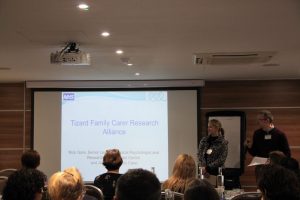 Following the launch of their group’s film earlier in the day, the Tizard / CBF Family Carer Research Alliance facilitated a workshop to discuss the ways in which research can better be co-produced by researchers and family carers to improve outcomes. Attendees looked at potential first research projects for the group and how they could become involved. They also looked at areas which have a need for more research to be conducted.
Following the launch of their group’s film earlier in the day, the Tizard / CBF Family Carer Research Alliance facilitated a workshop to discuss the ways in which research can better be co-produced by researchers and family carers to improve outcomes. Attendees looked at potential first research projects for the group and how they could become involved. They also looked at areas which have a need for more research to be conducted.
The actions from the workshop are available here
Can We Reliably Measure Quality of Life? Introducing the Personal Outcomes Scale
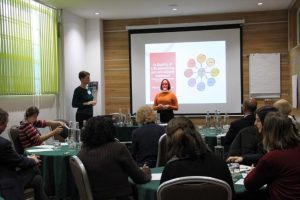 Helen Buxton and Ellen Kennedy from Mencap introduced the personal outcomes scale they have been developing. The group heard about how Mencap have adapted this tool for use in the UK and about progress with its use. There was discussion about how it is used now and how it might be used by others, for example to assess the effectiveness of an intervention, review how someone’s personal quality of life changes over time or to campaign on the impact of cuts.
Helen Buxton and Ellen Kennedy from Mencap introduced the personal outcomes scale they have been developing. The group heard about how Mencap have adapted this tool for use in the UK and about progress with its use. There was discussion about how it is used now and how it might be used by others, for example to assess the effectiveness of an intervention, review how someone’s personal quality of life changes over time or to campaign on the impact of cuts.
The actions from the workshop are available here
Posters
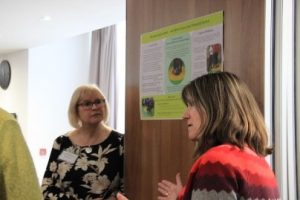
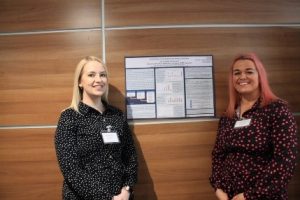 At the CB-NSG a new process was trialled for posters presented by core and associate members. A 25 minute slot was allotted on the agenda for poster viewing and in this time attendees were divided into five groups and were given 5 minutes to view each poster. Poster presenters were able to better introduce their work and discuss and answer questions with attendees.
At the CB-NSG a new process was trialled for posters presented by core and associate members. A 25 minute slot was allotted on the agenda for poster viewing and in this time attendees were divided into five groups and were given 5 minutes to view each poster. Poster presenters were able to better introduce their work and discuss and answer questions with attendees.
View some of the posters:
- Poster 1 by The Tizard Centre, Aneurin Bevan NHS Trust, Worcestershire Health and Care Trust, Lancaster and Sydney Universities and CORC (Children’s Outcomes Research Collaborative) : Special Measures- Equality and diversity feedback on outcomes measures
- Poster 2 by Southwark Enhanced Intervention Service: “EIS gave us the wake-up call”: Southwark Enhanced Intervention Service (EIS) 2009-2020 Outcomes
- Poster 3 by Advocacy 2 Engagement: Personal Space Mat© – be safe in your own personal space
- Poster 4 by Cumbria, Northumbria and Tyne and Wear NHS Trust: A New Model of Care- Evaluating the impact of an Intensive Positive Behavioural Support Team for young people and their families
Feedback
Feedback from the day was generally very positive. Presentations and workshops were rated as useful or very useful by delegates. Attendees also said they felt inspired and motivated by discussions and were grateful for the opportunity to network with other professionals.
Overall the day was rated highly by attendees with several 10/10 votes.
You can read the full evaluation of the day here
Thank you to everyone who contributes to the ongoing work of the CB-NSG.

